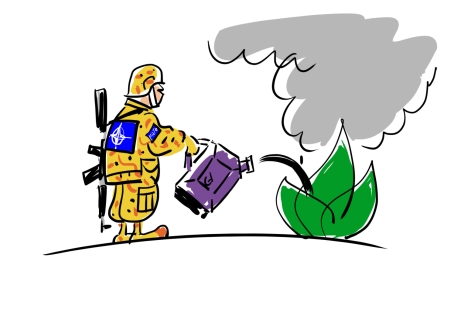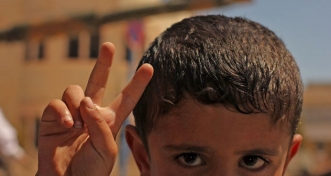Political Islam advances in the Middle East

Drawing by Alexey Yorsh. Click to enlarge the image.
The Arab Spring moves forward, engulfing one country after another, even though the overthrow of authoritarian regimes that brings political Islam to dominance (instead of prompting Western-type democratization) has become bogged down in the Syrian Arab Republic (SAR). The civil war in the country has grown into a conflict between ethno-confessional communities with the active participation of foreign players, each of whom pursues their own objectives.
The main facilitators and sponsors of the war are Qatar, Turkey and Saudi Arabia, supported by the West.
Syria is gradually turning into the primary target of international jihad volunteers which, should Assad’s government fall, makes it more than likely that the country either ends up as a failed state or collapses. The formation of yet another united opposition group in Doha is a demonstration of the alliance between Qatar, Turkey, the U.S. and France, with the Kingdom of Saudi Arabia playing an independent role in supporting radical Salafi groups in Syria.
No compromise with the acting regime is acceptable for the opposing sides. Any projects — including Russian projects — aimed at ending the conflict in Syria will be decisively blocked. The visit by Russian Foreign Minister Sergei Lavrov to the Arabian Peninsula has shown that the local players have no desire whatsoever not only to consider the Russian position regarding Syria, but also to discuss it with Moscow in any constructive way at all.
This shows the efficiency of the tactics adopted by Russia and China, who in the U.N. Security Council keep blocking the resolution that would enable an intervention following the Libyan scenario.
It would not rule out the possibility of the creation of no-flight zones, the formation of territorial enclaves on the border with Turkey and beyond the control of Damascus (where a revolutionary government would be formed as the alternative to the Assad’s government), and the participation of special assault groups in operations against the Syrian army and security forces without facilitation from the United Nations.
Central-Asian Spring possible
The renaissance of political Islam in the Middle East is fraught with possibilities for its spread outside of the region.
For instance, there is an extremely high chance that a Central-Asian Spring could be organized in Uzbekistan and Kazakhstan during the upcoming transitions of power in those countries. That would mean expansion of “democratic Islamization” into the Chinese XUAR (Xinjiang Uyghur Autonomous Region), the Russian Volga region and the Caspian Sea region.
Technically, there is nothing impossible about organizing riots and provoking conflicts between Islamists and local authorities in the internal regions of Russia and on the northwestern border of China, under the banners of freedom of religion and social justice and with the support of the “global community.”
As well as Uyghur separatists in China, Salafi groups in Central Asia and Russia can be easily recruited to carry out this scenario, given that they receive their financing and support from the same powerhouses that support the development of the Arab Spring.
Russia has a fairly good chance of dealing with the Islamist menace on its own territory, even though the operational situation in the North Caucasus (particularly in Dagestan, Tatarstan and Bashkortostan) shows that there is no room for complacency. The counterterrorist operation in Kazan has demonstrated how deeply rooted the problem is.
Cooperation with Central Asian governments and the government of China is especially important, in light of the approaching withdrawal of occupying U.S. troops (and smaller units of other countries of the coalition) from Afghanistan.
Moscow the outsider
It should be noted that Russia’s opportunities to influence the countries that make the biggest contribution to the expansion of the Arab Spring and the renaissance of political Islam are rather limited, if existent at all. The only country in the region interested in negotiating with Russia is Turkey, due to its economic interests – and it holds these negotiations on its own conditions and by its own rules, balancing between the West, the Arab countries, China and Russia.
The Gulf monarchies demonstrate their growing hostility toward Moscow: The rhetoric of their print and digital media is reminiscent of the Afghan war in the 1980s, the only difference being that they used to fear the Soviet Union, while Russia they choose to ignore.
The Islamic Republic of Iran feels no gratitude to Russia for the many years of support in the U.N. or for finishing the Bushehr Nuclear Power Plant despite international pressure, even though the Iranian lobby in Moscow keeps trying to find support in Russia in its confrontation with the West.
At the same time, contrary to the expectations of the proponents of the Iranian-Russian cooperation, Iran keeps insisting on a redistribution of the spheres of influence in the Caspian Sea region ‒ not to mention the suit against Russia that it filed in the International Court of Arbitration for a cancelled shipment of S-300 complexes.
Given that Gazprom feels ever-growing pressure on the European market from Qatar and Algeria (their gas supply is expected to reduce E.U.’s energy dependence on Russia), the oil and gas restrictions imposed on Iran are not a big problem for Russia – quite on the contrary, actually.
Evgeny Satanovsky is the president of the Middle East Institute. The opinion is abridged and first published in Russian in the VPK Daily newspaper.
All rights reserved by Rossiyskaya Gazeta.
Subscribe
to our newsletter!
Get the week's best stories straight to your inbox

